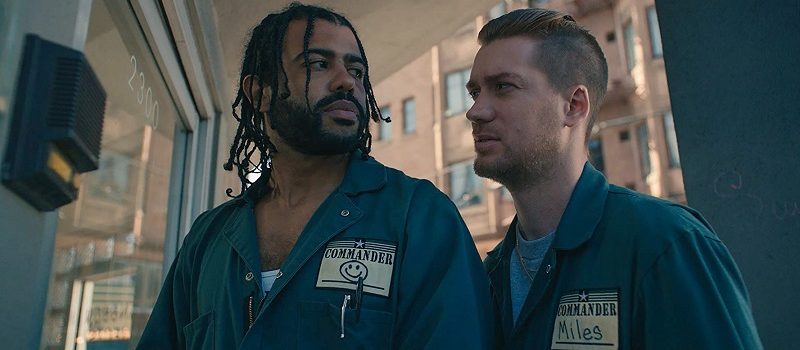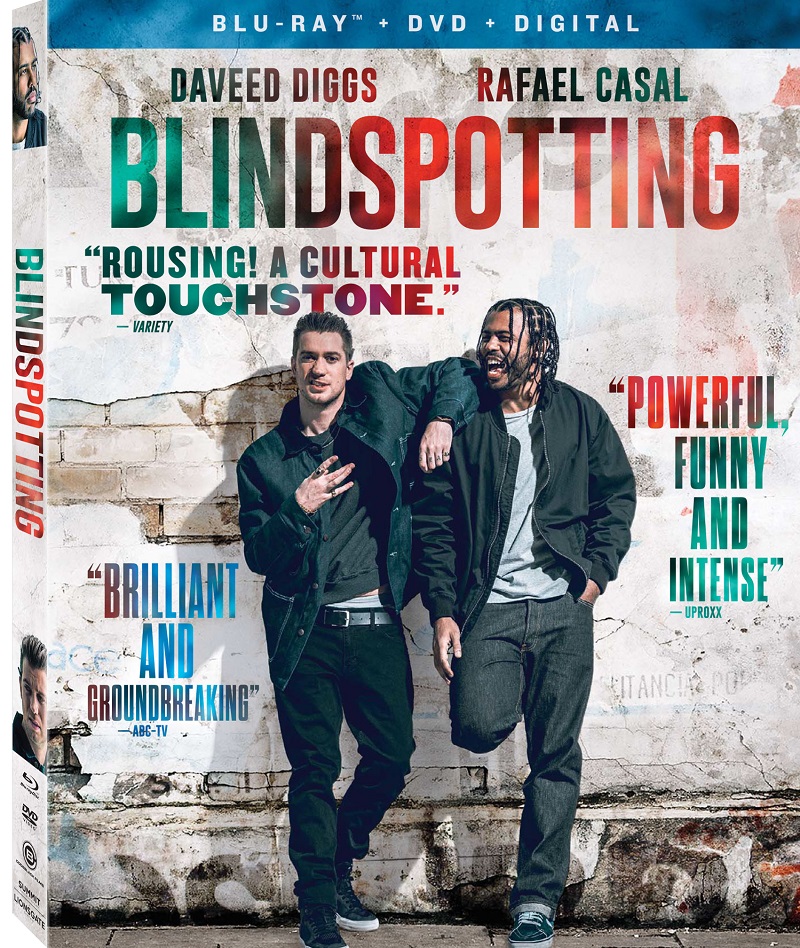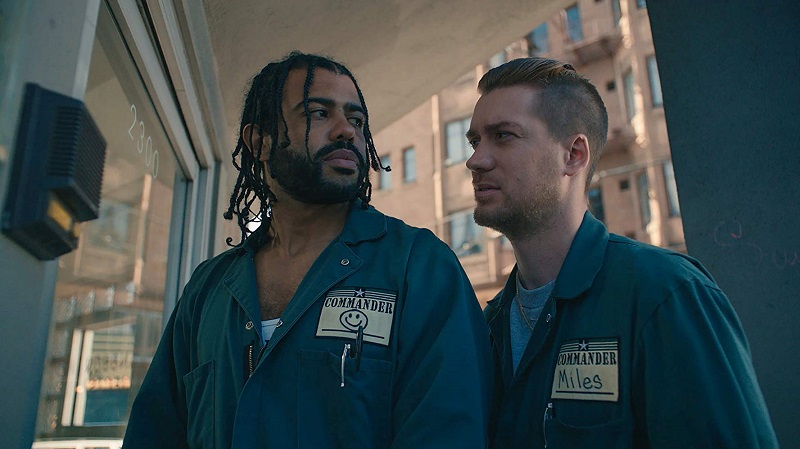Blindspotting is first and foremost, one of the best pictures of the year. The film chronicles three days in the life of Collin (Hamilton’s Daveed Diggs) … and they are some seriously stressful 72 hours for our protagonist and eye-opening entertainment for everyone who has the fortune of witnessing Carlos López Estrada’s film.
Estrada was the perfect match to helm the screenplay penned by Rafael Casal and Diggs—who also serve as our explosive stars. His command of the material is uncanny, as well as providing peripheral elements that add layers of richness to the film that will stick with you, long after those credits roll.
Collin and Miles (Casal) are best friends and have been since their youth walking the streets of Oakland. The BFFs are working as movers and in the process of this trio of tense days, we get a front row seat to the stunning world of Oaktown that involves a great divide between race, class and a police force that makes residents fearful of those charged with protecting them. Many of these officers do not even live in Oakland and their brutality towards those who live and breathe in these hoods is also a centerpiece of Blindspotting.
Another spoke in this wickedly awesome wheel? The gentrification of the beloved municipality that has those who have fought to make Oakland a great place to live on the outside looking in as rising rents and costs of living combine to make it tough to stay in the city that many have called home for generations.
Adding fuel to this fire is the fact that Collin is out of jail on parole. As such, he is to not fraternize with those who are doing any sort of illegal activity. When your best friend smokes weed, carries a gun and generally tends to pop off at the slightest provocation, getting through the final 72 hours of a year-long probation can be slightly complicated. What is so endearing about Diggs’ portrayal that and adds priceless emotive power to this entire tale is one gets the sense that Collin is a good soul, down to his core. When we learn why he was even put in jail in the first place, it’s frustrating because his head was firmly in the right place.
The landscape that is friendship is explored, on top of all these societal commentaries. How does one be there for a friend when that comrade is living a life that can prevent you from being your best self at the least and keeping your freedom at the most? It’s a difficult debate and one that is handled with supreme class and love through the prose and thespian talents of Casal and Diggs.
Early in the film, Collin is late getting back to the halfway house he is forced to live in as part of his probation. It is minutes after 11 p.m. (his curfew) and as he awaits a red light to turn green, a fellow African American man runs in front of his truck as he is being pursued by a white Oakland police officer. As the man runs away, he is shot multiple times in the back by the officer as Collin shockingly glares at the horror playing out right in front of him. The cop orders Collin to drive away, and he does. But the emotional toll this will play on him permeates every moment through the end of the film. It’s a complicated situation. He’s a parolee, who is out after curfew… does he say anything? Does he step up and be a witness for a person who has no one who can save his good name? With so much on the line, Collin’s decision is just one aspect of the dramatic core of Blindspotting, that somehow still manages to be quite funny throughout as well.
It truly is a stunning achievement and one that should firmly serve as an announcement of the two leads, as well as the movie’s director. It’s unique. It’s powerful. It is a must-see of the highest order.
As anyone who has seen (or even heard the soundtrack) Hamilton knows, Diggs has a pitch perfect penchant for delivering his lines in an elongated rap that packs so much punch. He does the same thing in this picture, and so too does Casal. It is a resonant means for getting a lot of dazzling dialogue into a short amount of space and although it is not done throughout, when that method is employed, it elevates everything about the scene.
The entire film is culled from a recipe that utilizes countless movie tropes in one concise cinematic achievement (it’s only 96 minutes of movie mastery). Friendship, loyalty, race relations, neighborhood identity, police brutality, the complicated emotion that is love and that innate need to simply laugh are all explored in the most touching, tender and tenacious way.
Film is a director’s medium, especially in the last few decades. As such, the bonus feature that stands out as a major highlight is Blindspotting: Director’s Diary. The featurette is surprisingly endearing and finds phone-recorded video from the making of the movie from the helmer himself. It introduces many crew members that do not usually get the home video bonus feature spotlight and speaks volumes to Estrada’s character, mission and yes, talent. It also possesses something that is hardly surprising… a whole lot of love for Oakland as host of the shoot, as well as it serving as the film’s subject.
Straight from the Town: Making Blindspotting also provides some unique insight into the creation of an instant classic. Getting insight from Casal and Diggs further adds to our impressive takeaway from the talent explosion that these two achieved on so many fronts with Blindspotting.
When it comes to audio commentary tracks, Blindspotting provides an early Christmas gift for film fans with not one, but two! Each one is seriously worth a listen. If you were lucky enough to catch the film in cinemas, dive right into one of these two and if witnessing the flick at home is your first go-around, buy this flick and make it a point to subsequently witness it with each of the commentary tracks… one by Casal and Diggs and the second by Estrada. Each is exceptional and provides insight into the making of a masterpiece that is unique and a marvel of modern moviemaking.
Film Grade: A
Bonus Features: B+



